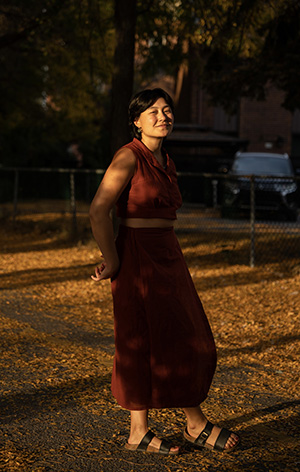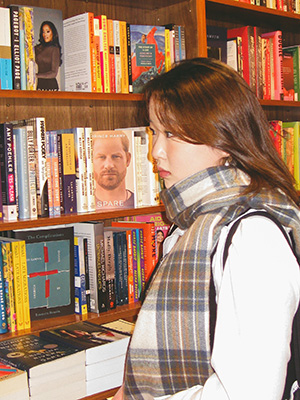Creating and Consuming:
Kyo Lee interviews Hannah Polinski

Volunteer Kyo Lee talks with Hannah Polinski, whose poems “my year of gadding around” and “FEAR ME! for I am back in the city” appear in our spring issue #230. They discuss the collision between eroticism and consumption, fighting against the limits of bodily experience, and how writing about sex should be no different than writing about food.
Hannah Polinski is a writer and filmmaker. Her writing has appeared in The Malahat Review, Contemporary Verse 2, carte blanche, Frontier Poetry, In the Mood Magazine, and more. She is the co-author of friend/shapes friend/scapes, a collaborative publication that uses poetry and photography to interrogate queer friendship, memory, and its retelling. As a playwright and theatre director, her original works have been performed on stage in France and at the Montreal Fringe Festival. Her first film perennials premiered at the Toronto Reel Asian Film Festival and screened at multiple festivals in Canada and abroad. She lives in Tiohtià:ke/Montreal and loves parties.
In “my year of gadding around,” there is the collision between eroticism and consumption, especially regarding the body, all of which is influenced by shame—what is the connection there? Is there agency in being consumed and/or consuming?
I’m interested in how to make a feast out of the body, and how the body feasts on pleasure. I see desire no differently than hunger—both need to be satisfied at some point. I’ve always felt too shy to write openly about sex and used to conceal it with highly unsatisfying nature metaphors or default to writing about trauma. The gadding that my title suggests is literary as much as carnal because I’m facing my own fears of talking about sex openly. Talking about sex is rooted in shame and fear for me and it has taken a long time to be able to do this, so I believe the agency lies in this act itself. Writing about sex should be no different than writing about food—everyone has their own preferences, sensations, and memories that go beyond the body. Whether you want to be consumed or the one consuming has little difference—being able to even discern that for yourself or evoke those images is interesting to me.
The poems exhibit a defiance toward mortality. Is there an undercurrent of a fear of or love for mortality? What role does mortality play in your writing, and how does it shape your relationship with pleasure and self?
I suffer from scarcity mindset and fear I’ll never have enough time to do everything I want. In that sense, I am very concerned with mortality. The idea of having finite time makes me erratic, so in “FEAR ME!” I am fighting against the limits of bodily experience. If I cannot experience all my desires, then I’ll write a poem where I do. So no, I will never die. I will go to the lake and back, again and again, as many times as I please. It’s an attempt to prove this to myself until it sinks in.
Both poems contain Greek and Roman classical allusions. In what ways do you find yourself inspired by the ancient world? Does it contribute to your, or the poem’s, understanding of pleasure?
I didn’t realize both my poems had classic Greek and Roman references, so I appreciate you bringing up that vantage point. What I know of the ancient world is limited so my choices to include them are not entirely conscious decisions. In “my year of gadding around” I wanted bodies on bodies and to be fed grapes like a Greek god to channel an abundance of desire. I like to think the ancient world considered pleasure and sexuality at face value rather than ascribing deeper societal and metaphoric meanings, which I find inspiring.
In “FEAR ME!” I reference a marble statue called The Rape of Proserpina by Gian Lorenzo Bernini, which I must Google each time before naming and even misspelled in earlier drafts of the poem. The statue is of great interest to me for its incredibly detailed hand tightly gripping Proserpina’s thigh. I wanted to channel this level of intensity in the poem, which is why the narrator grips her own thigh. She’s making moves on her own, not waiting for outside actors. She doesn’t need to wait for the Greek orgy; she’s doing her own thing.
Both “my year of gadding around” and “FEAR ME!” are written in a voice possessed by bodily urgency, which is different from my other work. These are two poems obsessed by agency, by the idea of a self that is not afraid to keep living, by a person who is both creating and consuming their own desires. It’s a voice that is learning to come into its own power, and I like to think that the narrator of “my year of gadding around” grows up to be the narrator of “FEAR ME!”
Despite their different forms, both of the poems seem to have peculiarities that break their own structures. In the first poem, the first stanza is the only one with five lines. In the second poem, the last lines are spaced and broken differently from the rest. What considerations do you put into form?
I tend to allow my poems to take on their own forms. I create line breaks where it makes sense but I find the poems generally come into themselves.
I love both of the poem titles. Do you have a process for developing titles?
I wrote “FEAR ME!” after returning to Montreal from a writing conference in the US that completely recharged my confidence as a writer. On my drive home, I came across a gang of butterflies seemingly dancing with one another on a beach. I later learned that butterflies only gather like this to feast upon the flesh of something dead and wrote “FEAR ME!” right after seeing this.
The title and poem were originally ironic but then I wanted to take it literally—you should fear me. I drove across the US by myself and read a poem about cum to a full audience of serious writers! My title was the result of the flesh-eating butterfly and my newfound confidence. However, this is rare—my titles are usually short and neat. Normally I come up with a descriptive two- or three-word placeholder of what the poem contains but then become attached to it over time, sometimes to my own detriment.
What are you working on now?
I’m directing a documentary where I interview people about their sexual fantasies and then reenact them in experimental ways. The film process is taking much longer than anticipated, but I’m trying to approach it like writing a poem and trust the process of trying new things.
I also have an ongoing Word doc where I dump every single thought on motherhood, dogs, and grief. Nothing is structured yet but it’s my first real attempt at a novel (scary). I want it to be somewhere between autofiction and poetry but still funny. There’s no plot yet, but the writing process is something I have a lot more faith in so I’m quite excited to see where it goes.

Kyo Lee









